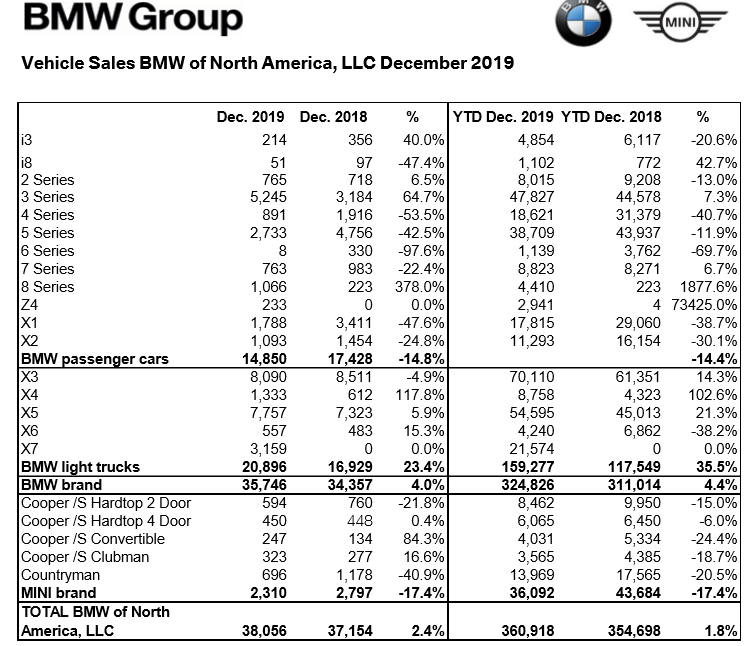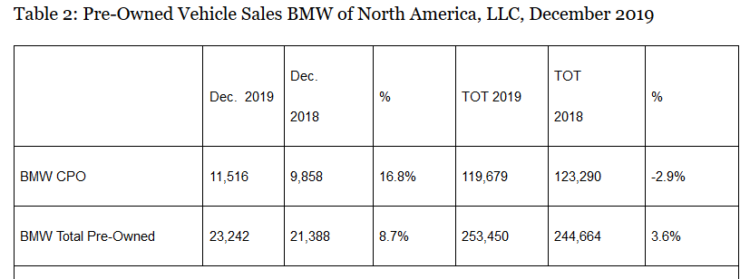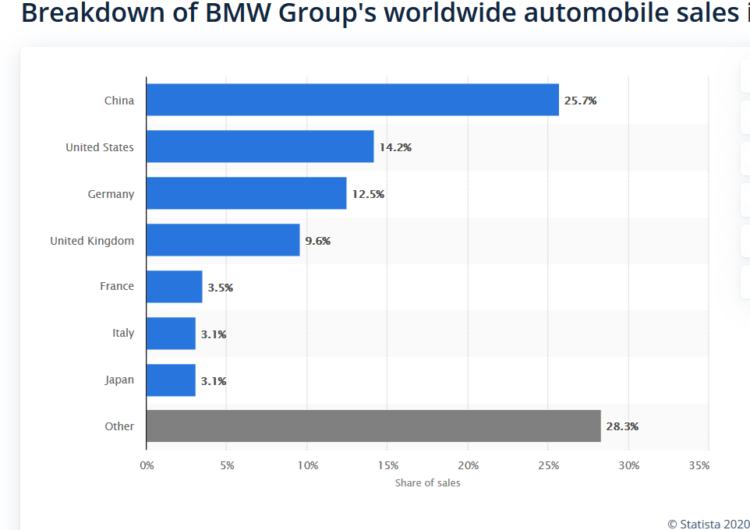
Happy 2020 to all. 2019 BMW sales were up 4.4 percent in the U.S., totaling 324,826 vehicles. That was good for the top spot in this market, beating Mercedes-Benz by about 8,700 and reclaiming the sales crown after four years. Lexus was third with 298,114 sold, and Audi fourth with 224,111.
However, those numbers may require an asterisk. In December it was reported that the SEC has launched an investigation of BMW’s sales practices. The company is suspected of sales “punching,” which involves dealers registering cars as loaners (which is recorded as a new sale) and then selling them later as lightly used. Fiat Chrysler paid a $40 million fine for such practices in September.
Globally M-B stayed on top, followed by BMW and Audi. BMW sold 2,168,516 vehicles worldwide, including the Mini and Rolls-Royce brands. BMW Group sold 145,815 electric vehicles in 2019, an increase of 2.2 percent but still far behind Tesla’s 367,500 last year. China continued to grow as BMW’s biggest market, almost double the size of North America:
Here at home certified pre-owned (CPO) declined less than last year (2018 was down 9.3 percent) while overall used car sales grew:
 Last year I predicted that by 2020 trucks would represent half of all BMW sales in the U.S. market. It happened in 2019. Trucks were 49 percent of all 2019 sales (159,277 and up 35.5 percent) while cars were 51 percent (total number not shown in sales graph at top, totaled 165,549 and down 14.4 percent). As previously noted if BMW did not count the X1 and X2 models as cars the numbers would even more truck heavy. Adding a new line to total truck sales was the brand new premium X7 model.
Last year I predicted that by 2020 trucks would represent half of all BMW sales in the U.S. market. It happened in 2019. Trucks were 49 percent of all 2019 sales (159,277 and up 35.5 percent) while cars were 51 percent (total number not shown in sales graph at top, totaled 165,549 and down 14.4 percent). As previously noted if BMW did not count the X1 and X2 models as cars the numbers would even more truck heavy. Adding a new line to total truck sales was the brand new premium X7 model.
The other number that jumps out at me is the decline in 3-Series sales. (BMW calls the two door model the 4-Series.) Sales of the 3-Series sedan rose 7.3 percent in 2019, but that’s not very impressive considering it’s the brand new G20 model. Usually a new generation would produce a bigger initial sales boost.
For example, the new G05 generation X5 drove sales up 21.3 percent in 2019, after sales had dropped 11.4 percent in 2018 for the preceding F15 model. That’s not a criticism of the F15 – my wife is very happy with the 2016 X5 we purchased in September.
Adding the 3 and 4-Series numbers in 2019 together equals 66,448 cars sold. That number was 75,957 in 2018, a decline of 13 percent in a high volume line car line that is vital for BMW’s future as a car company. Since the two door version of new BMW models typically come out first, it’s possible a lack of dealership inventory contributed to the 40.7 percent drop in 2019 4-Series sales. The first few months of 2020 should show where 3 and 4-Series sales will go this year.
New BMW buyers who don’t want a truck are increasingly going for a M model car. According to BMWBlog, it was a record year for M sales globally and in the U.S. market:
Over the course of 2019 BMW sold 135,829 cars wearing the M badge on the boot. This is an increase of 32.2 percent compared to 2018, which is pretty huge no matter how you look at it. The USA had a large contribution to that success, about a third of all M cars sold worldwide coming here. To be more precise the number of BMW M vehicles sold on US soil increased to 44,442 units. In the North American automobile markets, every seventh new vehicle boasting the white and blue brand logo is now an M model.
BMW is grappling with the same fundamental challenge as all the other auto manufacturers. They need to build bigger and more powerful vehicles that people want to buy right now while simultaneously preparing for an alternative fuel future. The major players are all making different bets on how much longer the internal combusion engine will be needed. BMW is saying 30 years.
Meanwhile, BMW will introduce more hybrids in 2020 and the first-ever, all electric version of its most popular vehicle the X3, which will be made in China. According to Pieter Nota, member of the Board of Management of BMW AG responsible for Customer, Brands and Sales, the key to success is to give every customer the technology they prefer:
“This confirms our strategic approach, the “Power of Choice”, which allows our customers to choose the optimal drive train for their preferred model. In this way, we are able to meet our customers’ individual mobility needs worldwide.”
Can BMW pull off this balancing act while increasing sales every year? I hope so, because a healthy BMW is good for every owner. Even one like me who prefers the older models.
UPDATE 4/6/20 – BMW NA sold 59,455 vehicles in Q1, a 15.3 percent decrease. Obviously COVID-19 played a big role, but without January and February numbers there is no way to know the extent. One sliver of positive news is that the new G20 3-Series is up 30.4 percent, totalling 10,613. However, the two-door 4-Series version is down 68.6 percent with only 2,197 sold. This low number reflects the fact that the two-door G20 4-Series won’t be available until later this year.
